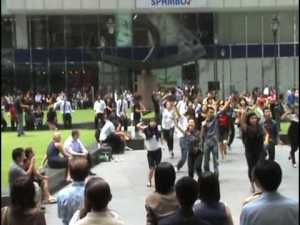- Joined
- Jul 24, 2008
- Messages
- 33,627
- Points
- 0
[h=2]Singaporean complains: Middle class is being ‘squeezed’ by the PAP’s economic policies[/h]Posted by temasektimes on June 11, 2012

A Singaporean Ramzah Osman has written to the TODAY Voices expressing his concerns at the PAP’s economic policies in response to Prime Minister Lee Hsien Loong’s speech at an economic forum last week during which he warned that Singaporeans will ‘fail’ if we are content to be ‘average’.
Mr Ramzah asked if Singaporeans are paying a high price in pursuit of economic growth:
“Singapore’s fast-ageing society is often cited by the Government to secure a steady immigrant inflow to ensure that our population is maintained at a reasonable level. This, though, has led to growing income disparity, as a portion of expatriates who were offered jobs here were given attractive remuneration packages.”
Though Singapore’s economy has grown by leaps and bounds in the last few years under the PAP’s ‘growth at all cost’ policy, the fruits of the growth are not shared equally among all Singaporeans leading to a widening income gap between the rich and the poor.
The relentless influx of foreigners buying up Singapore’s properties and cars have also squeezed the middle class who are unable to compete with them in terms of spending power:
“After taking up citizenship and with significant spending power, they would be able to buy cars and flats without batting an eyelid. With an increase in demand, prices of Certificates of Entitlement and housing would increase. Middle-income earners like me would be squeezed out of the market, as our purchasing power is not as strong. Less assistance, relative to the lower-income group, would be provided to the middle-income after this year’s “inclusive” Budget.”
Mr Ramzah concluded his letter by voicing out what most Singaporeans want:
“We simply wish for progressive growth, whereby everyone has an equal chance of creating a meaningful livelihood, and not just for foreign talent to be a stop-gap measure to ensure that we meet economic growth targets set by the Government.”
Unfortunately, the status quo is likely to remain so long the PAP remains in power and looks set to be so for the next hundred years at least.

A Singaporean Ramzah Osman has written to the TODAY Voices expressing his concerns at the PAP’s economic policies in response to Prime Minister Lee Hsien Loong’s speech at an economic forum last week during which he warned that Singaporeans will ‘fail’ if we are content to be ‘average’.
Mr Ramzah asked if Singaporeans are paying a high price in pursuit of economic growth:
“Singapore’s fast-ageing society is often cited by the Government to secure a steady immigrant inflow to ensure that our population is maintained at a reasonable level. This, though, has led to growing income disparity, as a portion of expatriates who were offered jobs here were given attractive remuneration packages.”
Though Singapore’s economy has grown by leaps and bounds in the last few years under the PAP’s ‘growth at all cost’ policy, the fruits of the growth are not shared equally among all Singaporeans leading to a widening income gap between the rich and the poor.
The relentless influx of foreigners buying up Singapore’s properties and cars have also squeezed the middle class who are unable to compete with them in terms of spending power:
“After taking up citizenship and with significant spending power, they would be able to buy cars and flats without batting an eyelid. With an increase in demand, prices of Certificates of Entitlement and housing would increase. Middle-income earners like me would be squeezed out of the market, as our purchasing power is not as strong. Less assistance, relative to the lower-income group, would be provided to the middle-income after this year’s “inclusive” Budget.”
Mr Ramzah concluded his letter by voicing out what most Singaporeans want:
“We simply wish for progressive growth, whereby everyone has an equal chance of creating a meaningful livelihood, and not just for foreign talent to be a stop-gap measure to ensure that we meet economic growth targets set by the Government.”
Unfortunately, the status quo is likely to remain so long the PAP remains in power and looks set to be so for the next hundred years at least.

